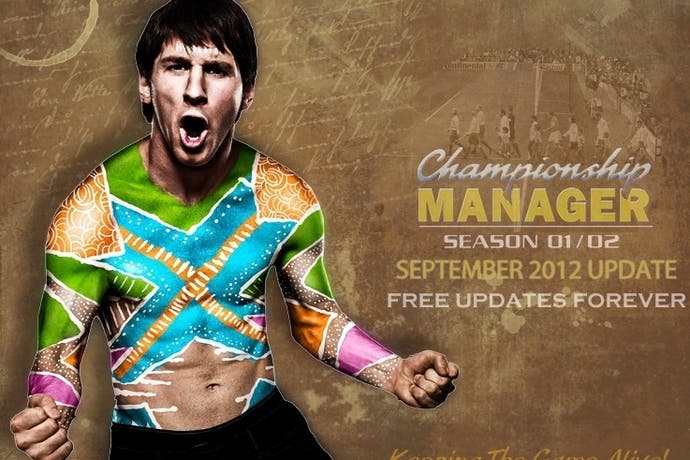Keeping the game alive
The story of the fans who never stopped playing Championship Manager 01/02.
As the football world is consumed by a new Premier League season, and while football management fans salivate over the trickle of new feature announcements for the next instalment of Football Manager, some are happier sticking with a relic of virtual football's yesteryear.
For one group of Championship Manager fans, the celebrated series never advanced beyond its Season 01/02 edition. Sports Interactive never left publisher Eidos for greener pastures at Sega, Championship Manager never became Football Manager, and there was never even a 2D match engine - let alone the fancy 3D one introduced in FM 2009 - to augment the game's iconic text commentary.
Champ Man 01/02 is frozen in time, a shrine to an approach to football management games that since went the way of the dodo - where realism takes a backseat to simplicity and fun. But it's also one of the most up-to-date and well-supported football titles around today. How can this be? And why would anyone want to play a 12-year-old interactive spreadsheet?
The story starts in 2003, when a contingent of forum regulars on leading fansite The Dugout gave up on Championship Manager 4 and its new 2D match engine. It was too complicated, they felt, and it was slow and buggy and not at all like the game they loved. So they went back to the previous season's edition.
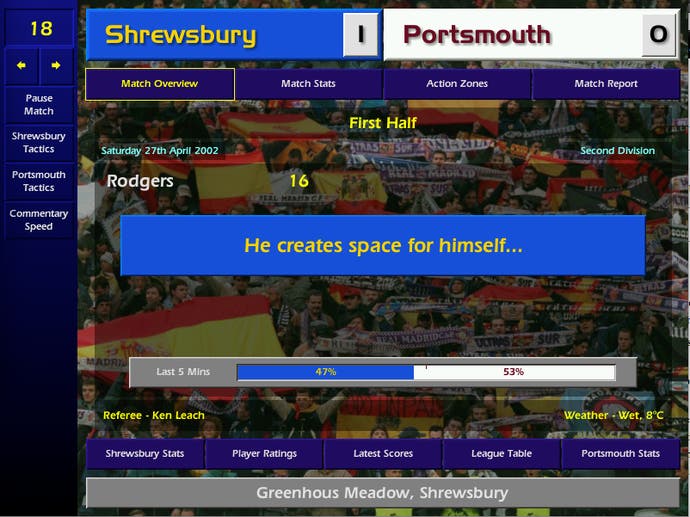
"After a while, I realised that the game was so popular that it needed a bigger place than a sub-forum on The Dugout," Mark Henderson recalls. He created a free phpBB forum on the 6th of October, 2005, which grew progressively larger as more Champ Man fans stumbled upon it or migrated from other communities. Forum-goers like Canadian Craig Forrest, who discovered the game through a Colombian friend in college then went online in search for help with tactics and transfers.
He started at a site called Project Championship Manager, delighting in the banter and discoveries that people shared, then found Henderson and co's Champ Man community via Google. Many regulars share similar stories, with a few around from the very beginning.
Scooterfan remembers the early days on The Dugout when one guy, Alex Sawczuk, produced twice yearly data updates, allowing players to keep up with the latest transfers. "It got to a point where he didn't have the time to produce them anymore," he says, "and different people took up the mantle without much success." From this spawned the idea of a separate forum with a group of people working together to continue the data updates, only more comprehensively - they wanted to cover each continent, every league, so as to "keep everyone happy."
Not everyone ended up being happy. After more than four years of ever-increasing size and popularity, a schism formed in the Update Team. "Some of the members began to have differences in terms of assigning attributes and values to the players in the database," Henderson says. "Some agreed, some didn't." So they split in two, with the disruptors known as the SIM team - on account of their focus on stringent accuracy - and the other team called ODB - representing the "original database" style used by developers Sports Interactive.
Henderson's relationship with the forum he created strained. He saw division and bickering in the community, and grew frustrated with some of the behaviours and attitudes floating around. A year after the split, and around five years after starting the site, he decided to take a break. "I actually sold the website to a chap called WelshRed and have only recently (in April) regained control," he says.
As is the way with hobby projects, WelshRed no longer has time to manage the community while Henderson now does (again). The community he returned to managing had shed its division - the SIM team folded into the ODB team in early 2012 due to personal commitments among its core members - and it was thriving.
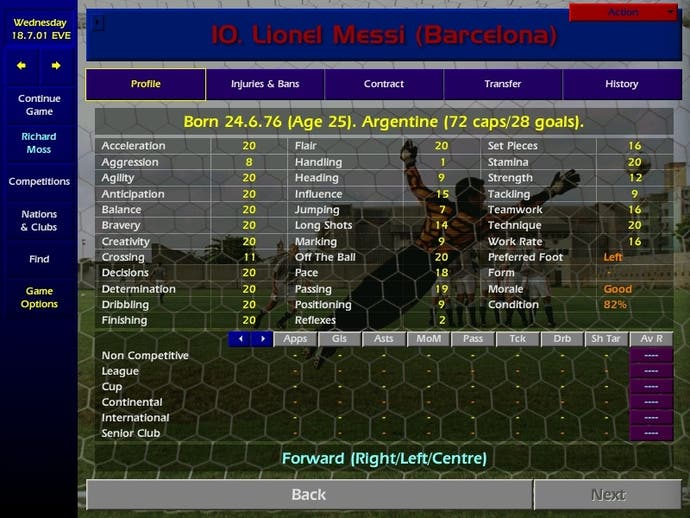
The reunited Update Team now stands at a healthy 22 members, divided into five Board members (they're in charge), nine Coaches (they update the database), and eight Scouts (they suggest attribute values and other changes). Official Update Team releases routinely receive more than 30,000 downloads - the precise numbers and trends are hard to gauge because the statistics were reset during a server change last year - while the more experimental unofficial back-dated historical databases of 80s and 90s leagues draw significant love and attention from the regulars.
There are epic stories of incredible careers told with wonderful panache and creativity, and there are regular challenges, too, such as managing England with only players in the English First Division or lower or winning the Champions League within five seasons as Viking FK (while keeping four up front and only selecting Scandinavian players).
I had to see for myself what all the fuss was about, so I downloaded a copy of the game (Eidos released it as freeware in 2008), installed the last official patch, grabbed the March 2013 update, which gives you last season's players and teams, and took up the mantle at an ailing Portsmouth, curious to see whether I could reverse their fortunes.
To a player of the latest Football Manager titles, Championship Manager 01/02 seems alien, almost otherworldly. There are signs in there, of course, that it came from the same developer. The text commentary, for instance, which remains today as one part throwback and one part augmentation to the 3D match engine. Or the propensity to leave out flashy graphics in favour of cold hard numbers and an intense shade of blue. But the spawn of the Collyer brothers has shifted dramatically in the intervening decade.
Days flash by in mere seconds, players and coaches scantly bother you at all, the press stays oddly silent, scout reports are pretty much useless, and just about everything you do has an air of staring into a crystal ball, hoping to interpret its vagueness correctly. This is not Football Manager, simplified; it's a wholly different beast, an ancestor from further down the evolutionary ladder that we'd thought extinct.
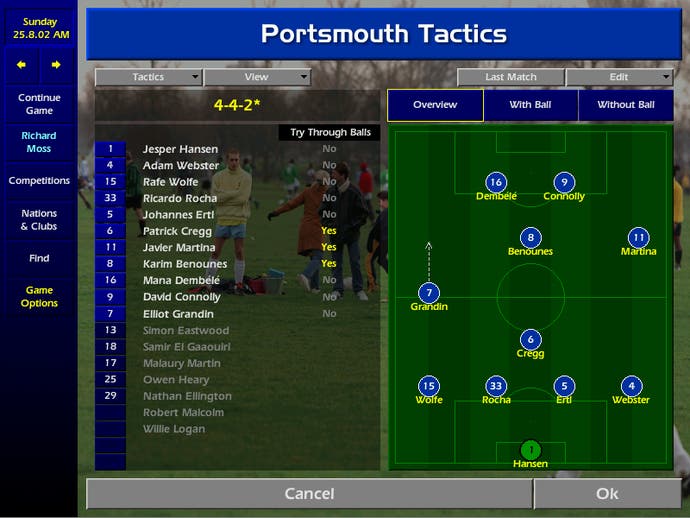
CM01/02 pays lip service to realism. It's all the glory and none of the work. And that's what makes it so enthralling. Seasons pass in hours, not weeks (or months, as I would normally play FM). No sooner is one match played than the next begins. You don't have to worry about team talks, press conferences, backroom meetings, or anything of the sort. You pick your team, set up your tactics - which includes no player roles or sliders and only a dozen vague yes/no individual player instructions - and send them on their way.
It's simple, but there's enough depth and complexity that you feel in control and vulnerable to external forces all at the same time - the master of your fate and the victim of somebody else's.
Age has done nothing to dull its charms, although the ugly user interface and annoying maze of menus are more noticeably crap than they used to be. And even as I proceeded to get Portsmouth relegated to the third division (League 2, in modern parlance), I had a sense that I understood the appeal of embracing Champ Man's old ways.
I posed the question to several of the forum regulars, unsurprised to find similar thoughts. "For me it is the simplicity that has taken me in," says ZanSnake. "No BS about talking about this player, or manager, or occurring event like FM, but to do what is needed to be done - to be a manager."
Scooterfan agrees, with a caveat. "I probably had a week off work at the time [of its original release], and since then no other management game has come close or had the addictiveness to keep me going back for more," he says. "[But] over the years I have missed new features such as new league formats, realistic wages/transfers, Champions League formats and maybe having increased difficulty."
That may be the straw that eventually breaks CM01/02's back. The footballing world is changing, introducing new rules and regulations and modifying old ones. Each year the structure of the game gets further out of date, forcing compromises and negating what little realism existed. It's like an alternate reality where football stopped evolving in 2001 but players like Messi and Ronaldo nonetheless emerged and thrived.
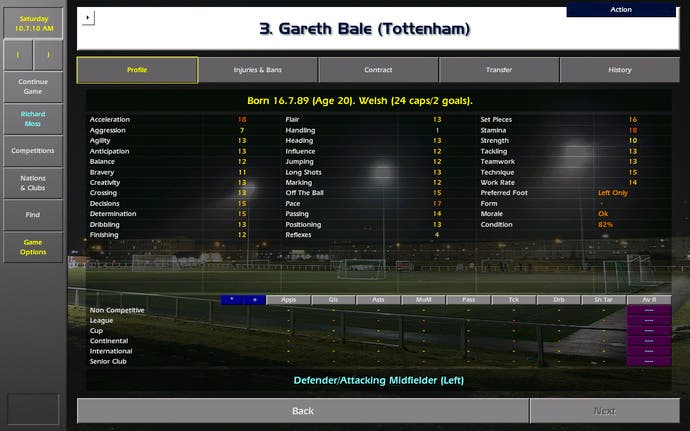
The community has had modders working on such problems over the years, the best known being a mysterious chap called Tapani. It's hard piecing together Tapani's story now, after multiple forum resets led to posts being archived all over the place, but he was a programmer and a student (who became a teacher). Tapani seldom posted on the forums, often disappearing for months.
But for five or six years, starting in September 2005, Tapani developed and released custom patches. These fixed design flaws, updated the rules and league sizes, tuned the match engine and "regen" (regenerated) players, changed the game start date, improved parts of the interface, and more. They also introduced a number of crash bugs.
Most updates have "Tapanified" versions made to open them up to Tapani patch users. His patches have been described as a revelation - a game changer for both the community and Champ Man itself - and he has been immortalised in Champ Man canon.
Yet his disappearance is perhaps emblematic of the problem the community faces. Championship Manager is a very time-consuming game. When people get busy, they stop playing. Many never return. And for the younger generation of football management fans, it may be too dated, too quirky, too old-school to earn serious consideration - especially in the presence of Football Manager Classic and Football Manager Handheld, which offer many of the same benefits in a mobile-friendly and ever-improving package.
ChampMan01/02 visitors have declined somewhat, Henderson says, but they remain high enough to keep the forum alive. Some 90% of visitors are guests, however, with many likely being non-native English speakers like BlackyM's fellow Croatians: "You can add that here in Croatia, there are lots of people still playing this manager. I played it online [via network games] with many people," he says. "Many of them don't even post here, nor are registered, but they get updates and play a lot."
So what keeps people visiting? Three things, from what I could gather: updates, love of the game, and a great forum atmosphere in which everybody respects one another. All these add up to one big idea. If the community dies, the game does too. Or as topaztiger1983 puts it, "It's about keeping the game alive, and everyone here helps us to achieve our goal."
That's the thing. For 12 years they've all obsessed over what they see as the greatest football management game ever made. No one person could keep a game of such scale ticking along for over a decade. This is a community effort, where through every fight, every update, and every discussion they all have one goal in mind: to keep the game alive.
